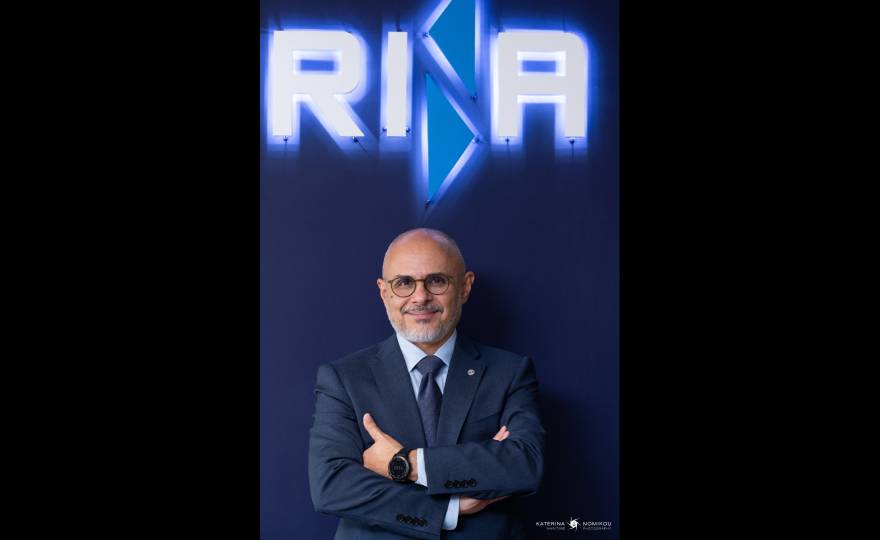Spyridon Zolotas, South Europe and MEA Senior Director at RINA, addresses the challenges we face in adopting new technologies and meeting regulations: “As we navigate through the complexities of integrating new technologies such as large battery storage and hydrogen fuel systems, it is crucial to also enhance the infrastructure supporting these innovations.
The goal is to not only meet but exceed global emissions regulations, thereby securing a sustainable future for the maritime industry.”
Key Projects
Recent projects include a collaboration with a global leader in the engineering and construction for the energy and infrastructure sec- tors on the use of ammonia: an initiative that encompasses studying the installation of ammonia containment systems and the use of ammonia-fuelled engines and gas turbines. Another ground-break- ing project with Eni focuses on the use of HVO (Hydrogenated Vegetable Oil) biofuel produced by Eni, as well as of other energy carriers such as “blue” or “green” hydrogen and ammonia from biogenic, renewable or waste raw materials not competing with the food chain, in the naval sector.
In March 2024, we signed an agreement with Eni and Fincantieri to develop joint initiatives for the energy transition. With this partner- ship we formalised the commitment to develop joint projects to decarbonise the maritime sector in the medium to long term with the goal of Net Zero by 2050.
RINA is also working with the industry on methanol options. In April, the company awarded an Approval in Principle to the Greek NAP Consulting for their design of a methanol-ready RoPax vessel. Methanol offers a viable alternative as it can reduce the carbon dioxide in emissions generated by marine diesel oil or marine gasoil, especially when bio-methanol is used.
A further project with Aasen Shipping showcases how immediate actions can lead to substantial environmental benefits. It has integrated hybrid propulsion with batteries in its ships, which now set a benchmark in fuel efficiency, significantly reducing annual fuel consumption and, consequently, emissions.
When considering new fuels, shipowners are faced with problems relating to available onshore infrastructure and knowing which fuels will be readily available for bunkering in the future. In the light of this consideration, LNG represents a good interim solution. Together with Maran Dry Management Inc. and SDARI, RINA developed a project for an LNG and hydrogen powered 210,000 DWT bulk carrier. The concept is based on a propulsion arrangement which reduces the running machinery at sea and combines the ship’s fuel (LNG) with steam to produce hydrogen.
Design and Operational Efficiencies
RINA recognizes that innovation in ship design and operations plays a critical role in achieving efficiency. For instance, the Greece- based ferry company, Attica, has revolutionized its fleet management through digital transformation, optimizing operations and reducing emissions effectively trough SERTICA.
The role of digitalisation cannot be overstated. RINA’s SERTICA suite has now been implemented on over 2,600 ships, enabling precise monitoring and reporting of fuel consumption and carbon intensity, crucial for meeting regulatory standards and optimizing performance. The integration of enhanced Safety Management Systems (SMS) further ensures compliance with safety standards while streamlining operations, helping the industry’s transition to greener practices. Planned Maintenance System (PMS) technology now also incorporates real-time data analytics that can anticipate when a ship needs maintenance. This means ships can avoid unnecessary breaks in operation and keep critical parts running longer. Predictive analytics will help operators know exactly when to do maintenance, avoiding the extra costs and risks that come with doing it too early or too late.
In the end, the power of data analytics will be crucial for making informed decisions in ship operation. By analysing information such as fuel use and equipment function, shipowners and operators can gain valuable knowledge. This knowledge leads to better deci- sion-making that improves both the cost-effectiveness and environ- mental sustainability of maritime journeys.
Future Outlook
Looking towards 2030, RINA envisions a significant shift towards low-carbon and carbon-neutral fuels including biofuels, synthetic fuels, and LNG, along with a focus on alternatives like green hydrogen and ammonia. Battery technology will evolve, facilitating the broader adoption of electric and hybrid propulsion systems, especially in short-sea shipping. Innovations in battery density and charging infrastructure are expected to enable longer journeys and faster turnarounds for electric vessels. Nuclear power should also not be ignored as a viable option for decarbonisation. Furthermore, the continuous push to reduce emissions will likely drive increasing advancements in ship design, including the use of advanced hull coatings, air lubrication systems, and wind-assisted propulsion technologies. These are set to decrease fuel consumption further and enhance operational efficiency. We also anticipate the emphasis on digital tools and predictive maintenance systems will continue to revolutionise fleet management, making operations more proactive and efficient.
* South Europe and MEA Senior Director at RINA










